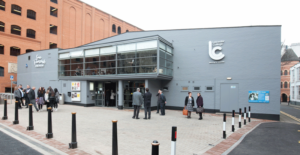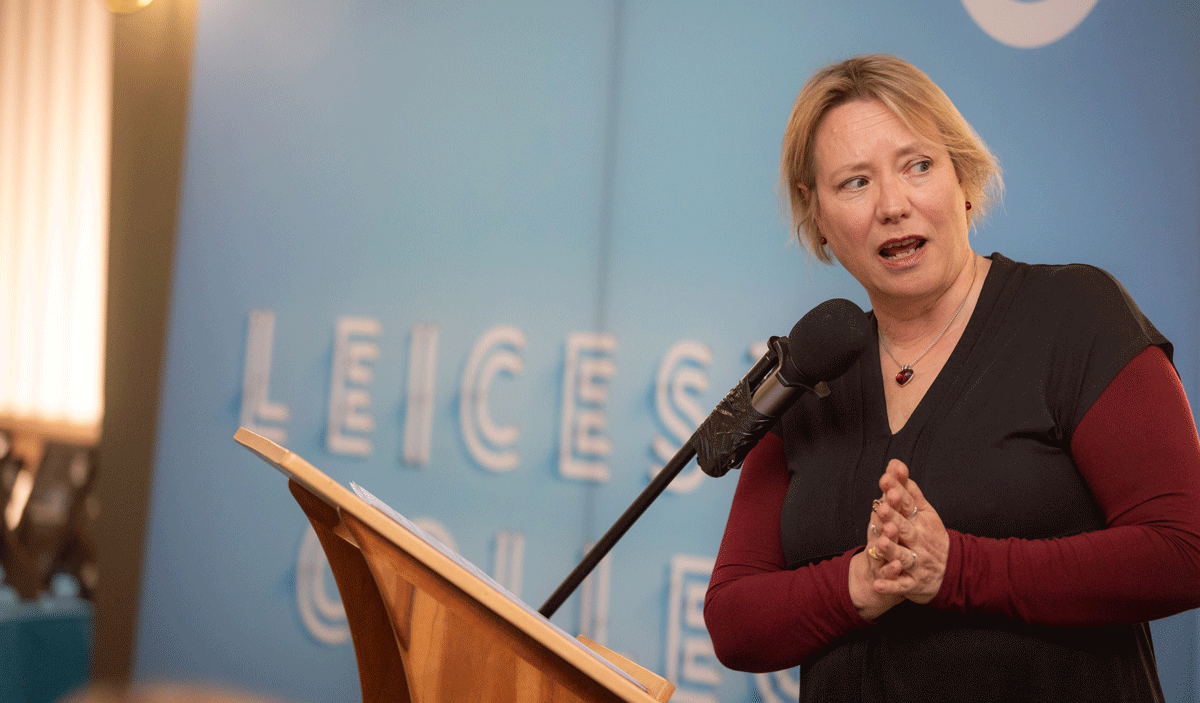In every sector, in every part of the world, every business leader you speak to will tell you that their top priority is finding a pipeline of young people with the talent, skills and motivation needed to keep their business running into the next generation. If that pipeline has a point of origin, it is in places like Leicester College. “We are the place that a person can come to and really change their life,” says Verity Hancock, Principal of Leicester College.
Hancock means what she says. The point of Leicester College is that it provides a start to as many people as possible.
“We are not just part of the standard educational system. If your education did not give you very much then we can give you another shot at learning a trade or higher education,” Hancock tells us. “Wherever you are, whatever you come to us with, we can help. We have people who come to us with no education and leave with a degree.”
Careers for the Future
Leicester College offers a wide range of high-level technical and vocational skills that give its students access to a whole range of careers.
“What’s important is that we are not just training people for the careers you can see around you now, but the ones that are going to be available in the future,” Hancock says.
To ensure that Leicester College is able to prepare students for those careers, the college itself must be constantly improving, updating, and invigorating itself.
“I went to a comprehensive school and left in 1985, an ordinary state school, and I went back in 2017 and literally nothing had changed. Even the desks were the same,” Hancock points out. “If I said nothing had changed since 1985 nobody would come to Leicester College. We have to invest in technology, buildings, the latest software, and hardware to make sure the students that come to us for engineering, construction, and creative industries are able to move into universities and employment with the same high standards.”
 Hancock describes the process as like painting the Forth Bridge – as soon as it is done, you go back to the start and start again.
Hancock describes the process as like painting the Forth Bridge – as soon as it is done, you go back to the start and start again.
“Our oldest building was built in the 1800s, but we are undergoing a constant process of reinvestment and reinvention,” she says.
In the current cycle of innovation the college is benefiting from the implementation of “T Levels”, a parallel qualification to A Levels, and uniquely that implementation has included capital investment alongside the new awarding bodies and teaching materials.
“We have gone whole-heartedly into developing T Levels because they are good quality qualifications for bright people who want an alternative to the academic route, and it has come with significant investment in our facilities,” Hancock tells us.
Those investments include a complete rebuild of Leicester College’s engineering block, and new equipment for its hospital wards, such as an “electronic woman” that simulates giving birth to help midwifery students. But while STEM is a priority for the government, and Leicester College is investing heavily here, it is also providing support for everything from hairdressing to acting classes.
In building these courses, Leicester College also works with local businesses of all sizes to ensure that students are prepared for real jobs in real workplaces.
“When we are dealing with smaller employers, we do not expect them to deliver things for free or design our curriculum for us, but we want people who have an interest in creating that pipeline of talent for the future,” Hancock says. “There are companies, both large and small, that provide apprenticeships and who see building the workforce as part of their responsibility.”
It is Leicester College’s relationships with these employers that make it stand out.
“We are not divorced from the world of business and employers,” Hancock tells us. “There is no point in attracting young people and adults if we cannot offer a path with a really good career at the end. That is not all education is about, but we want to show there is a route through to employment. That is what sets us apart from other institutions.”
Space City
When you think of Leicester you most likely think of the textile industry, or Walker’s Crisps, but what you might not know is that for the last 20 years, the city has seen a burgeoning aeronautics and space industry.
“People who don’t know Leicester don’t necessarily associate it with space, but Leicester is a real focus for a whole range of businesses working in the space and aeronautical sector,” Hancock tells us. “We are building kits for use in space, and there are a whole range of organisations based in and around Leicester. There is the Space Park, which is a massive initiative next to the National Space Centre building. We have a cluster of organisations who are going to need a really skilled workforce in the near future.”
To encourage that industry, Leicester needs to attract the workforce that industry needs, and Leicester College has invested heavily in achieving that. But it is not just seeking to train people in the skills and qualifications that the space and aeronautical sector needs. It is also looking to make sure that this workforce reflects the population of Leicester as a whole.
“Leicester is diverse, but the people working in this sector right now are not. It should not be the privilege of only white middle-class guys to be doing this job,” Hancock says.
 Right for Everyone
Right for Everyone
That diversity goes along every axis. When we speak with Hancock, Leicester College is in the process of developing a strategy for inclusivity but already serves a huge number of neurodivergent students or students with additional needs.
“We adapt everything we do to make sure our offering is right for everyone,” says Hancock. “There are a huge number of people with valuable skills and abilities, and we do not want to rule anyone out. We want to fit the opportunities to the people.”
To provide those opportunities, Leicester College needs teaching staff, and that is a challenge in this day and age.
“Staff in further education have been paid well below what they’re worth because it hasn’t been given the funding that it needs,” Hancock says. “As much as we would always like to pay people more, it can be difficult to attract people out of the industry, so we try to be a good employer and attract people with all the other things that make working in education worthwhile. We offer good holidays, huge benefits, and opportunities to grow, but most of all it is so motivating seeing how you can change people’s lives.”
Leicester College is set to continue changing lives, further expanding its facilities, and offering to help everyone it can.
“Even if you’ve got no qualifications at all you can come to Leicester College and see a path all the way to degree level or a good job,” Hancock says. “We intend to keep building on the technical excellence we offer, staying ahead of the game in STEM and creative subjects. We want to continue to improve all of our facilities, professionalise our staff and progress as many students as we can through our pathways.”







